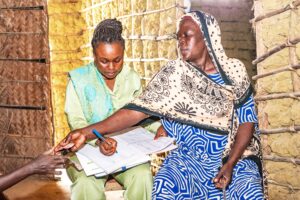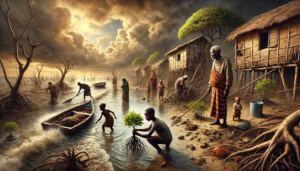
The wWw project is built on the collaboration between the Aqua-Farms Organization (AFO) and the Institute of Development Policy (IOB), University of Antwerp.
AFO is a Tanzania-based NGO that has extensive experience with local citizen science projects and community involvement in several projects, including topics on seaweed, mangrove restoration, river water quality monitoring, and working with fishing communities.
IOB on the other hand has ample experience with small and large research projects, including citizen science projects (e.g. Fuatilia Maji project)
Cretus Joseph Mtonga, the co-founder and executive secretary of AFO, and the IOB team (Diana Tiholaz, Sara Dewachter, Nathalie Holvoet) first met on the 8th of December 2021, when the IOB team together with Mzumbe University staff organized a conference in Morogoro, Tanzania. The aim of the conference was twofold. First, COMMUNITOR was launched; a Community of Practice (CoP) bringing together actors sharing an interest and being involved in citizen science initiatives. Second, it was also the moment at which the findings from the University of Antwerp alumni barometer project were disseminated to a broader audience of students, academic staff, practitioners and other interested participants.
The women water watch (wWw) project did not want to only involve citizens in the data collection phase, but also have the community be involved in the project from the very beginning. To that end, village meetings were organised to find out the most important challenges citizens are facing with regard to water. Moreover, the project also explores the already existing local knowledge on water quality and management to build on in this citizen science project.
From 10 to 12th of September 2022, wWw organised several village meetings inviting all citizens from the 5 project villages, the selected women monitor teams as well as local officials and professionals working on the issue of water, such as the ward community development officer, hamlet leader, the village chair, the village doctor, officials from water authorities…

Photo: Community Development Ward Officer sharing cer addressing the members of the hamlet during the meeting with villagers
The women monitors were given an active role to voice concerns and needs regarding every day water use and management as they are key actors involved in the fetching, storing, treating and the use of water, even though their voices are often unheard in water policy issues. During the meetings several issues were raised as key challenges for the community, such as the water quality, water conflicts and the collective responsibility for the cleanliness and maintenance of water sources. Villagers mentioned the safety of the drinking water as a key issue due to the presence of waterborne diseases such as schistosomiasis, diarrhea, typhoid fever, amoeba and cholera. The village doctor indeed also confirmed these issues and highlighted the importance of clean drinking water for the people’s health. Additionally, conflicts between farmers and livestock keepers were also mentioned because cattle drinking from the river can contaminate the river water which is then later used for irrigation in agriculture and even for drinking. Community members also raised the issue of garbage in the wells and the need to increase the willingness of the community members to participate in keeping water sources clean e.g. planting trees along the water sources. Finally, in some village meetings challenges such as high concentration of salt and reduced water availability during dry season and the distance to water sources were flagged as crucial.

Photo: Woman monitor explaining the water and treatment challenges in the village
When asked about the importance of monitoring the water quality, the participants in all village meetings agreed that monitoring was important to prevent further disease outbreak and to encourage treating water in case of pollution. The villagers believed that the data on water quality monitoring should also be shared with the water authority (RUWASA – The Rural Water Supply and Sanitation Agent) which should help to trigger government to make changes in these villages. The villagers feel like the problem is often overlooked or forgotten…So with science maybe the leaders will listen.
–
Author: Cretus Mtonga & John Kimaro


